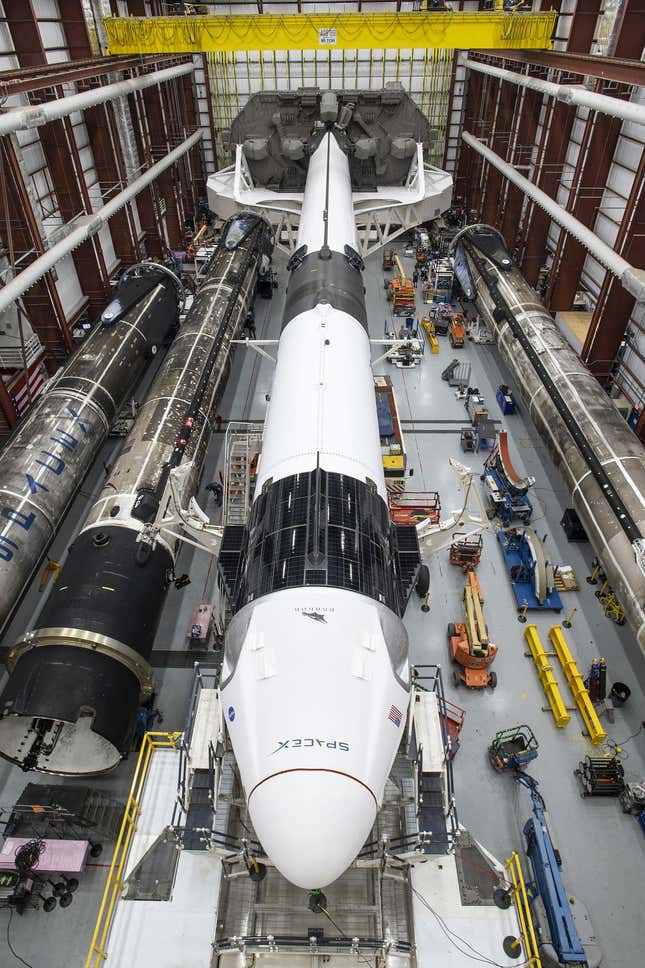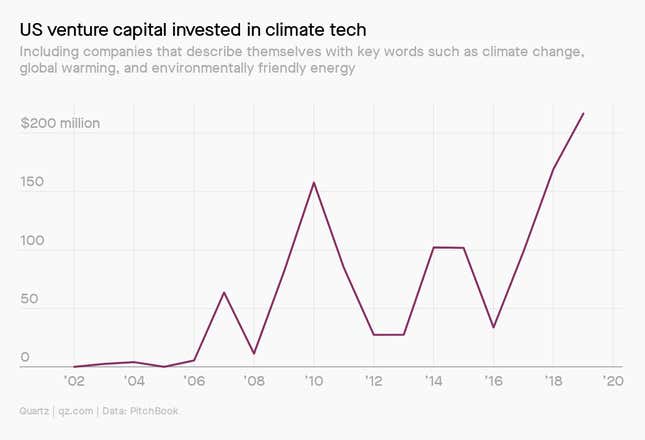Dear readers,
Welcome to Quartz’s newsletter on the economic possibilities of the extraterrestrial sphere. Please forward widely, and let me know what you think. This week: Go Dragon, transition watch, and Satan’s role in early American rocketry.
🚀 🚀 🚀
The four astronauts heading to the International Space Station on Nov. 14 will mark a number of firsts—the SpaceX Dragon’s first flight after being officially certified by NASA to fly humans, the first international astronaut onboard a commercial spacecraft, and the first time NASA has packed four people in a space capsule.
The milestone I’m pumped about is way more boring: It’s the first time the Federal Aviation Administration has licensed a crewed mission for NASA. The US space agency has its staff fly commercial when they travel between terrestrial research centers for work, and now it’s doing the same when they head for the national laboratory in orbit.
The FAA has been licensing satellite launches since 1989, but flying astronauts to orbit was a government business until SpaceX’s crewed flight test of the Dragon earlier this year. The arrival of privately-operated human spacecraft is changing that.
There are a lot of metaphors for government efforts to commercialize technology, and every single one has been deployed on behalf of the space industry. It’s like the internet, you see, or the transcontinental railroad, or maybe dirigibles. (Ok, I made the last one up.) My favored comparison, and one not as widely known today, was the Air Mail fiasco (pdf) that birthed the modern aviation industry.
In the 1920s, the US government subsidized private airlines who delivered mail for the postal service, often with surplus World War I military aircraft. This became a huge mess as airlines abused the subsidies by flooding the system with postcards and colluded to divide up the routes. But after the Army Air Corps proved unable to do the job safely, it was handed back to the private sector with a more thought-through approach. This ultimately led to the growth of passenger airlines and the US aviation industry we know today.
The episode proved influential in many ways—notably, the political scandal led William Boeing to step down from his eponymous aviation conglomerate—and it explicitly inspired the NASA commercial crew program that boosted SpaceX in its early days and brought us to this new era of private spaceflight.
With the FAA now responsible for the safety of this launch, the US is taking a necessary step for space transportation to become commonplace. Just yesterday, Axiom Space announced that three private astronauts signed up for a trip to the ISS later in 2021. Get ready for the roaring twenties.
🌘 🌘 🌘
If low-earth orbit is now about exploiting the infrastructure developed in the last decade, the next generation of space start-ups is aimed squarely at the moon. This week, Japan’s ispace announced plans to open a new US office in Colorado. The company said a team of engineers there will develop a large lunar lander to compete for NASA robotic exploration contracts.
Kursten O’Neill is the new director of that program, after spending seven years at SpaceX leading the development of the Falcon 9 Block 5 and the Falcon Heavy. Her new job features smaller vehicles but equally large challenges, as recent failed moon missions underscore. “It’s a steep technical challenge,” she tells Quartz, but says that two precursor missions being developed in the company’s Tokyo headquarters will provide vital data that could be a leg up over other competitors.
Apologies—I forgot to link to our Momentus Space scoop last week, which left a number of readers confused for good reason. Thank you for your patience!
IMAGERY INTERLUDE
A nice look at the Falcon 9 rocket and the Dragon space capsule of the launch that will carry the next crew to the International Space Station.

👀 Read this 👀
Since 2018, more than $900 million has been invested in 86 climate tech startups globally, more than the prior 10 years combined. The biggest investments went to companies like nuclear start-up Commonwealth Fusion Systems ($199 million over two years), and the lab-grown meat company Wild Type, which closed a $12.5 million deal in 2019.

While that may sound like a lot, consider that space-focused start-ups raised $5.7 billion in 2019 (pdf) alone. US-based venture capitalists only invested about $217 million in 20 climate tech startups last year, just 20% of the total global investment in the sector. Our latest field guide asks whether Silicon Valley investment can really decarbonize the economy.
🛰🛰🛰
Not a Quartz member?
Our subscriber program launched two years ago, attracting tens of thousands of people interested in the new global economy. To celebrate this anniversary, we are offering a 50% discount on an annual membership with code MEMBERSWEEK. It gives you unlimited access to subscriber-only reporting from around the globe, and supports our array of helpful newsletters—if you’re only reading Space Business, check out the other delights we have for your inbox. (Sorry, this offer does not apply to Quartz Japan memberships.)
🌏 🌏 🌏
SPACE DEBRIS
No Moon 2024. Whatever changes in US space policy the election brings, you may hear it stopped the Artemis program from landing astronauts on the moon in 2024. That’s not true: The latest appropriations bill from the Republican Senate doesn’t provide the cash needed to build a moon lander in time, making clear that this Congress just doesn’t support the timetable. The accelerated lunar return was technically dubious when it was announced in 2019, but eighteen months later, we can also say it didn’t gain sufficient political support. A first challenge for president-elect Joe Biden on space policy will be reconciling lawmakers priorities with the promise of lunar exploration, significant past investment, and exciting partnerships with private companies.
Transition Time. Biden has announced the teams that will transition NASA and other government space agencies to new leadership in 2021. Let’s do some bold-faced names! First, current NASA chief Jim Bridenstine has said he will step down, which was apparently his plan all along. (Wonder where he winds up?) When it comes to individual agencies, there doesn’t seem to be an obvious commercial space person at the Department of Commerce, but former astronaut and National Oceanic and Atmospheric Administration (NOAA) head Kathy Sullivan is on the list. On the Pentagon team, CSIS’ Andrew Hunter has an interest in space procurement.
The NASA team is lead by Ellen Stofan (former chief NASA scientist, now head of the National Air and Space Museum) and includes Waleed Abdalati (another former NASA chief scientist, now a University of Colorado prof), Jedidah Isler (a Dartmouth University astrophysicist), Bhavya Lal (a space policy researcher at the government lab IDA), Pam Melroy (a former astronaut who has held a number of space policy jobs), Dave Noble (an ACLU official and Obama-era NASA bureaucrat), Shannon Valley (a climate scientist who was an Obama-era White House liaison to NASA), and David Weaver (a former top NASA spokesperson and Biden legislative aide).
It’s early days, but it is safe to say the Biden focus is on earth science, and that advocates of lunar exploration and commercial partnerships will be wondering who is representing them. What are you watching during the handover?
Could it be… SATAN? From the annals of space history I didn’t know, meet Jack Parsons—pioneering rocket engineer, Jet Propulsion Lab co-founder, and demonic occult enthusiast. Parsons’ experience in the free-wheeling southern California of the ’20s and ’30s, soon to be a TV show, is a reminder that science and fiction have always intermingled in the space business, however novel today’s entrepreneurs may seem.
Speaking of, Vanity Fair has a new profile of Elon Musk that won’t surprise anyone keeping tabs on the erratic rocketeer, but does sum up Musk’s state of mind as he balances his hatred of criticism with his need for attention.
Your pal,
Tim
This was issue 73 of our newsletter. Hope your week is out of this world! Please send all tales of occult space activities, nominations for a space policy transition betting pool, tips, and informed opinions to tim@qz.com.